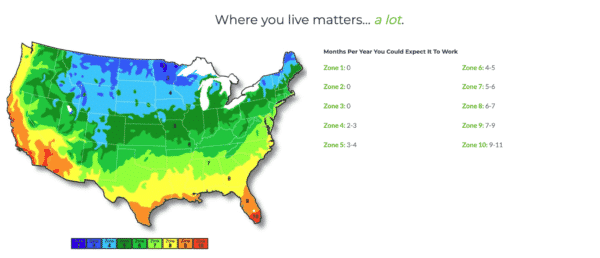
We know what you may be thinking…” why would someone WANT flies?” If you raise chickens or garden, then you may agree that flies can be a nuisance. Therefore, how exactly can they help with backyard farming? Well, one thing that is important to clarify is that these aren’t your typical house flies. Actually, they are much more cool, useful, and interesting! That’s why we’ve put together 3 ways that Black Soldier Flies can dramatically change the way you farm.
Wait…but what are Black Soldier Flies (BSF)?
Black Soldier Flies are a small mouthless wasp that, once established, can help eliminate up to 5 pounds of food waste per day. This fly is also a predator of the common housefly. Black Soldier flies don’t even sting or bite either!
Eliminate Food Waste – Both in the Kitchen & Garden
- Did you know that the U.S wastes around 40% of food?1 Chance is that you’ve likely gone through the month having to dispose of a few items due to spoilage. Food is thrown in the trash, gets picked up by a trash company, then later dumped in a large landfill. A cycle that’s less than exciting and even more detrimental to our environment.
- Don’t you wish there was a better way to put that food to use? Now, if you have chickens…you may opt to throw the scraps to your flock. If you have a composter, you may throw some leftover veggies for future plant food. However, those two options have their limitations. Your moldy bread shouldn’t be a scrap for your birds and raw spoiled fish should definitely not go in your composter. Now…imagine if you can dispose of this waste in a manner that won’t leave waste to aromatically engulf your kitchen or attract the neighborhood trash raccoon. This is where the Grubcone™ comes in to radically change the way you recycle and see food waste forever! Easy to assemble and even easier to use, the Grubcone™ is a simple backyard addition that takes easily degradable food waste and, with the power of the Black Soldier Fly, breaks down and eats everything that you can’t and don’t! All with leaving little to no trace! A non-energy-powered way to make food waste disappear. A pretty good solution if you ask us!
Feed Black Soldier Flies To Your Chickens
- If you’re a backyard chicken parent, you may have come across dry grubs as a treat for your birds. Grubs are a delight to your chickens and are considered a super-feed with 40% protein and a high-fat ratio. And must be supplemented by scratch feed (or another carb source) for laying hens to get the balanced nutrition required to maximize laying performance. If you live in a rural area with livestock then you can supplement grubs to your waterfowl, cows, goats, horses, etc. They even say people can eat them…but we’re good with just saving it for our flock only 😉
Production Waste Fertilizer
- You know how the Grubcone™ and Black Soldier Fly can battle food waste, but how about its benefit to your garden? Although the black soldier fly grub can’t exactly be sprinkled to your garden, its production waste sure can. Depending on where you live, the black soldier fly has a season where it’s composting at full speed, but it also has a season where it stops during the cold, much like us. At this time it’s best to scoop out what little is left in your Grubcone™ to use in your Greenhouse Fall/Winter plants. What you’ll be left with is a mixture of organic super mineral plant fertilizer that your future transplants will love. Then when the next season rolls around, begin the cycle all over again!
Click or Tap to Expand Map
We hope you enjoyed reading about how the black soldier fly and Grubcone™ can change the way you recycle food waste. Give us a call or visit our Grubcone™ product page to learn more about the BSF! And see how with one simple backyard addition, you can make a small difference in our environment. 🙂 support@roostandroot.com
Citations:
[1] Gunders, Dana. “Wasted: How America is Losing Up to 40 Percent of Its Food from Farm to Fork to Landfill.” Natural Resources Defense Council, 2017. https://www.nrdc.org/sites/default/files/wasted-2017-report.pdf



